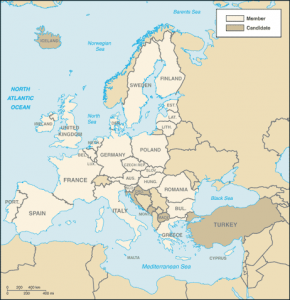HIV infections up in Europe
The number of new human immunodeficiency virus (HIV) infections has increased by 8 percent from 2011 to 2012 on the European continent, according to new data from the European Centre for Disease Prevention and Control (ECDC) and the WHO Regional Office for Europe released today.

European Union Map
Image/CIA
More than 131,000 new HIV infections were reported in the WHO European Region in 2012, 10,000 (8%) more than in 2011.
The ECDC reports a 9% rise in eastern Europe and central Asia (EECA) countries and a less than 1% rise in the countries of the European Union and European and Economic Area (EU/EEA).
While reported AIDS cases showed a steady decline of 48% in the EU/EEA between 2006 and 2012, the number of people newly diagnosed with AIDS increased by 113% in the eastern part of the Region. This increase is closely linked to low coverage of prevention measures and antiretroviral therapy (ART). Although the number of people who received ART increased considerably from 2011 to 2012, they represent only one in three people in need.
“Our data show that nearly every second person tested positive for HIV in the EU/EEA – that’s 49% – is diagnosed late in the course of their infection – which means they need antiretroviral therapy right away because their immune system is already starting to fail”, highlights ECDC Director Marc Sprenger. “This shows that we need to make HIV testing more available across Europe to ensure earlier diagnosis and more effective treatment and care.” The ECDC HIV testing
guidance helps countries in their efforts to identify HIV infections early: it provides key information on why, where, how and when to test for HIV.
“We know that providing antiretroviral therapy earlier will allow people with HIV to live longer and healthier lives, and will reduce the risk that they transmit HIV to others”, says Zsuzsanna Jakab, WHO Regional Director for Europe. “While we are not at the end of the HIV epidemic in Europe; our goal of halting and reversing the spread of HIV by 2015 is still achievable in many countries”.
The human immunodeficiency virus (HIV) is a virus, which attacks the immune system and causes a lifelong severe illness with a long incubation period. The end-stage of the untreated infection, acquired immunodeficiency syndrome (AIDS), results from the destruction of the immune system. AIDS is defined by the presence of one or more “opportunistic” illnesses (other illnesses due to decreased immunity).














